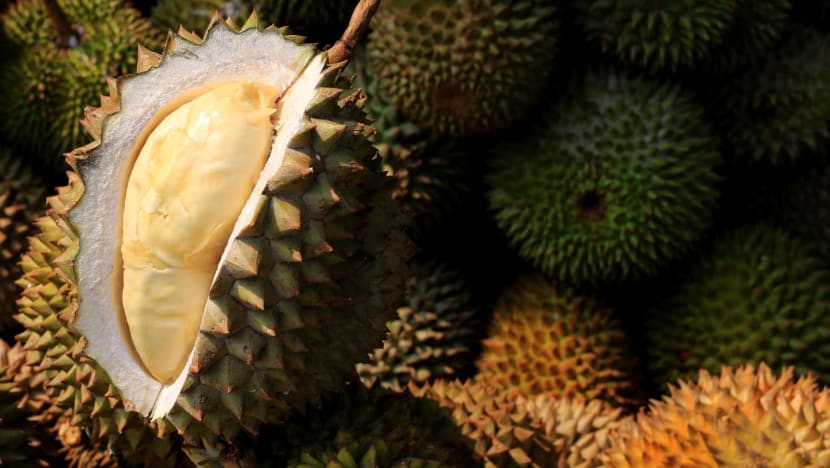Thai durian growers brace for China's stringent import checks under zero-COVID-19 policy

Thailand prepares to export hundreds of thousands of tonnes of durians to China in 2022. (Photo: iStock/Yamtono Sardi)
BANGKOK: Durian plays a crucial role in the Thai economy because the fruit is much loved in its key export market - China.
In 2021, Thailand exported more than 875,000 tonnes of the spiky fruits to China. This generated at least US$3.4 billion, according to statistics from the Agriculture Department.
This year, the country aims to export even more durians as larger harvests are expected, but China’s zero-COVID-19 policy could have an adverse impact on Thailand’s durian export in the coming season.
The stringent strategy has caused traffic congestion at various border crossings, where thousands of trucks carrying food supplies from Southeast Asia undergo inspection for the coronavirus.
Thai industry players said in case of detection, the goods would be destroyed and the border could be closed for several days or weeks.
Already, many farmers in Thailand have been affected, especially during last year's longan season.
“The damage was immense, with tens of thousands of tonnes of the fruits estimated to have spoiled,” said Mr Chonlatee Numnoo, director of the Agricultural Research and Development Office in Region 6.
Region 6 is home to Thailand’s biggest durian producers, which includes the eastern provinces of Chanthaburi, Rayong and Trat.
According to Mr Chonlatee, the production of durians in the eastern region alone is expected to reach 740,000 tonnes this year, not to mention 210,000 tonnes of mangosteens - another important export to China.
“It’s difficult for us to control it because there are chances of detection by random checks. Moreover, given the current situation of COVID-19, the Omicron variant is easily transmitted and spreads fast. So, we’re quite concerned,” he told CNA.
To minimise risks of contamination and prevent unnecessary delays, Thailand has been working on its own zero-COVID-19 strategy at durian farms and packing houses.
This includes carrying out COVID-19 testing for workers regularly, requirements for facial masks and gloves, body temperature screening, as well as disinfecting the produce, the packaging and the vehicles that would transport them across the borders.
“We must ensure our packing houses are free from COVID-19,” Mr Chonlatee said. “Even for the drivers who will bring in trucks, we also have control measures for them. For example, they have accommodation specially designated for them.”
There are 702 packing houses for export fruits in eastern Thailand, 630 of which are located in Chanthaburi.
Related:
THAILAND HOPES TO EXPORT DURIANS VIA CHINA-LAOS RAILWAY
Thailand exports durians to China by land, sea and air each year. Currently, the main route is via Laos and Vietnam, which share border crossings with China.
With the strict COVID-19 protocols along the borders, however, the Thai government hopes the fruits can be exported to China this year by the new high-speed railway linking the Lao capital Vientiane and the Chinese city of Kunming.
“We are trying to join them,” Mr Chonlatee said. “The Agriculture Department is trying to get all the preparations done for this coming season. It could be some time in the middle of this year.”
The durian season starts around March but hits a peak between mid-May and mid-June.
If the Thai government manages to secure the rail route for fruit exports to China by then, Mr Chonlatee believes it would help ease the situation at land border crossings significantly and distribute more fruits to Thailand’s major market.
“The capacity of the train is quite high. One trip could transport about 35 containers or maximum 50 containers,” said Mr Panusak Saipanich, president of the Thai Durian Association.
“This could solve a lot of problems in the export sector. If the railway deal is successful, we won’t have to be stuck at land border crossings. In case any of them is closed, the rail route could take up the transport for a long way.”
Currently, Thailand can only use the high-speed railway to export rubber, cassava and goods related to ore. Fruits are yet to be included.
“We’re waiting to see if China will approve it in time for this fruit season because in May, we’ll have both durians and mangosteens,” Mr Panusak said.
“If there is any incident at the land border crossings, there will be considerable impact and this is worrisome.”
BOOKMARK THIS: Our comprehensive coverage of the COVID-19 pandemic and its developments
Download our app or subscribe to our Telegram channel for the latest updates on the coronavirus pandemic: https://cna.asia/telegram














